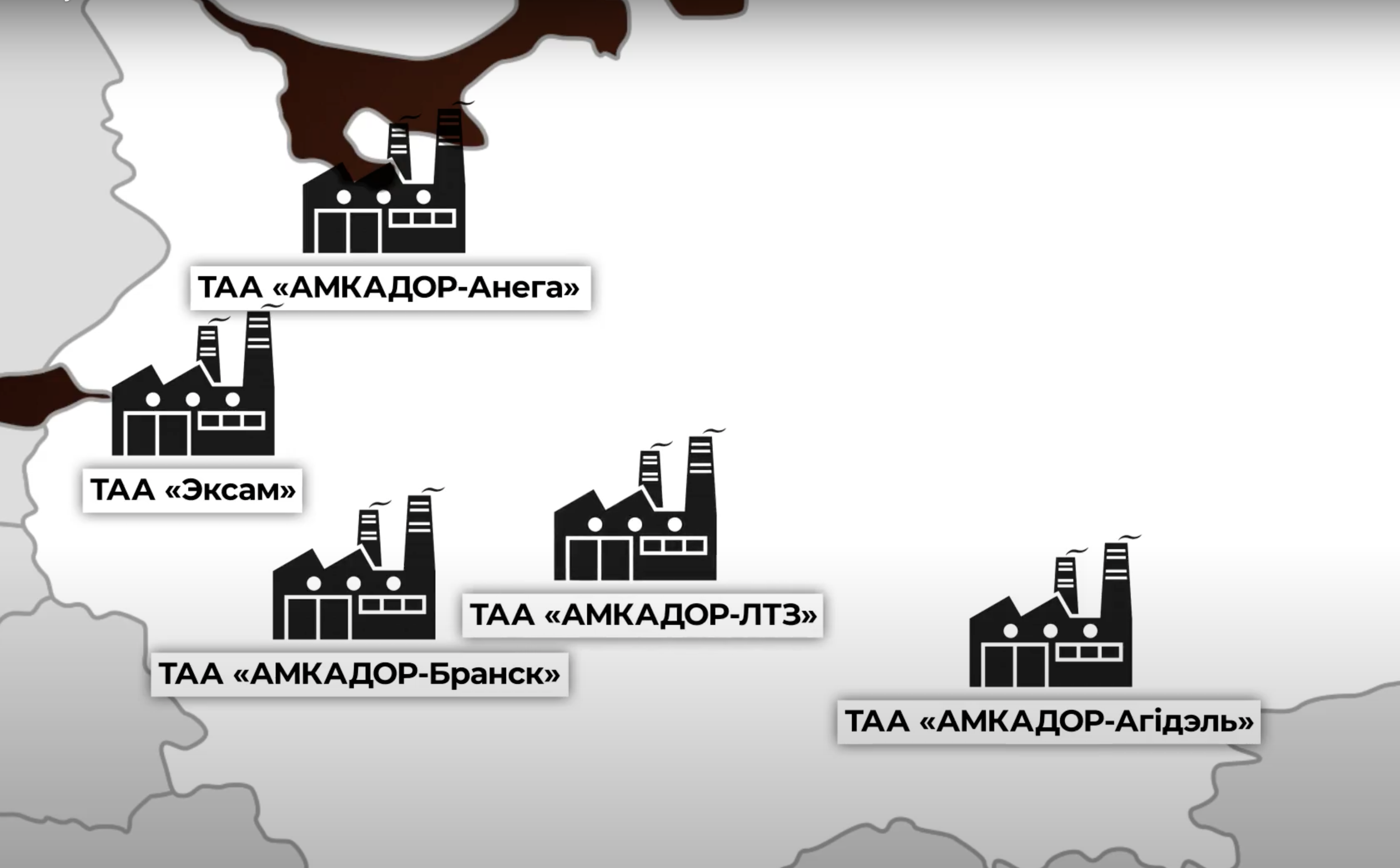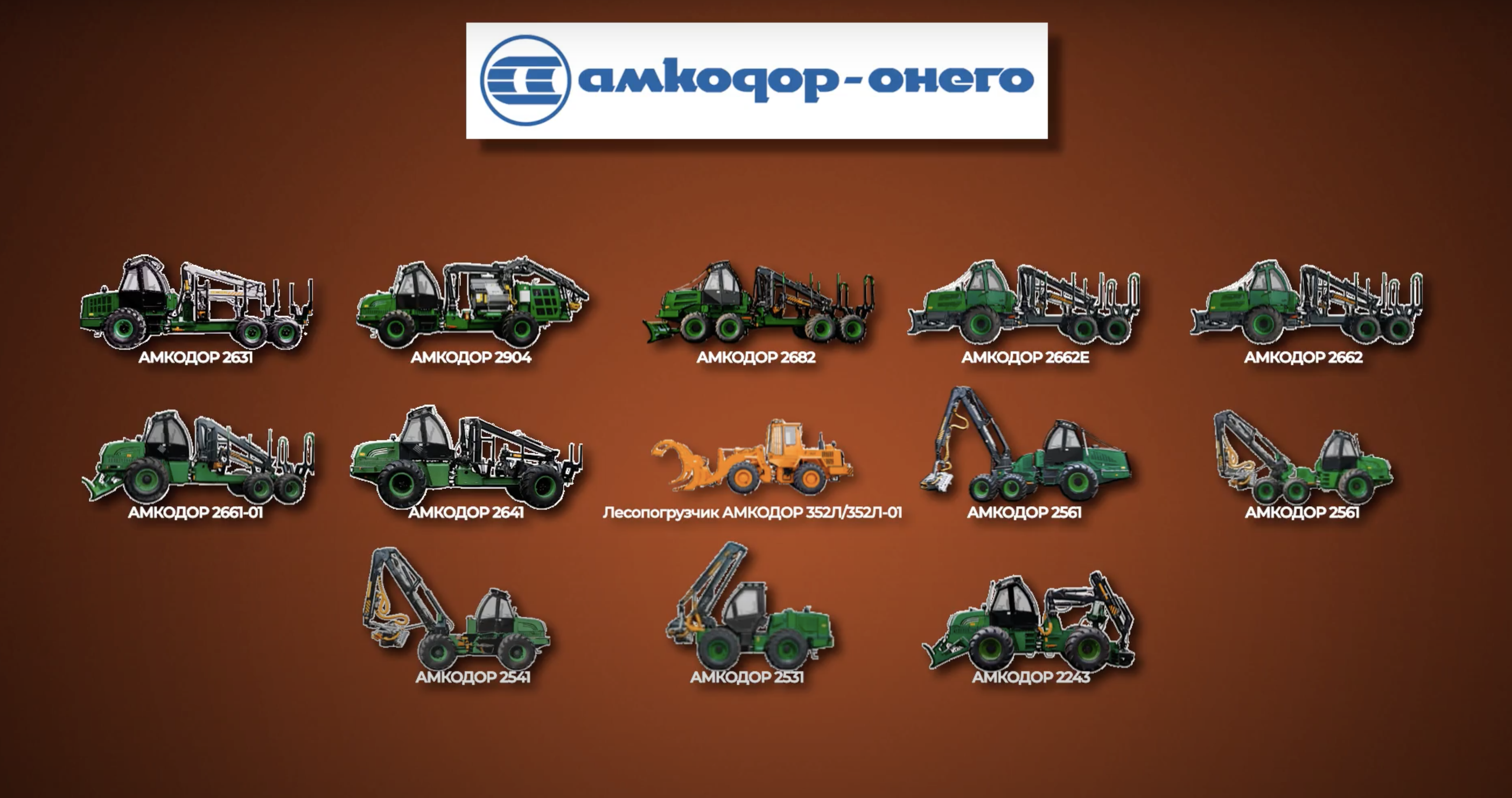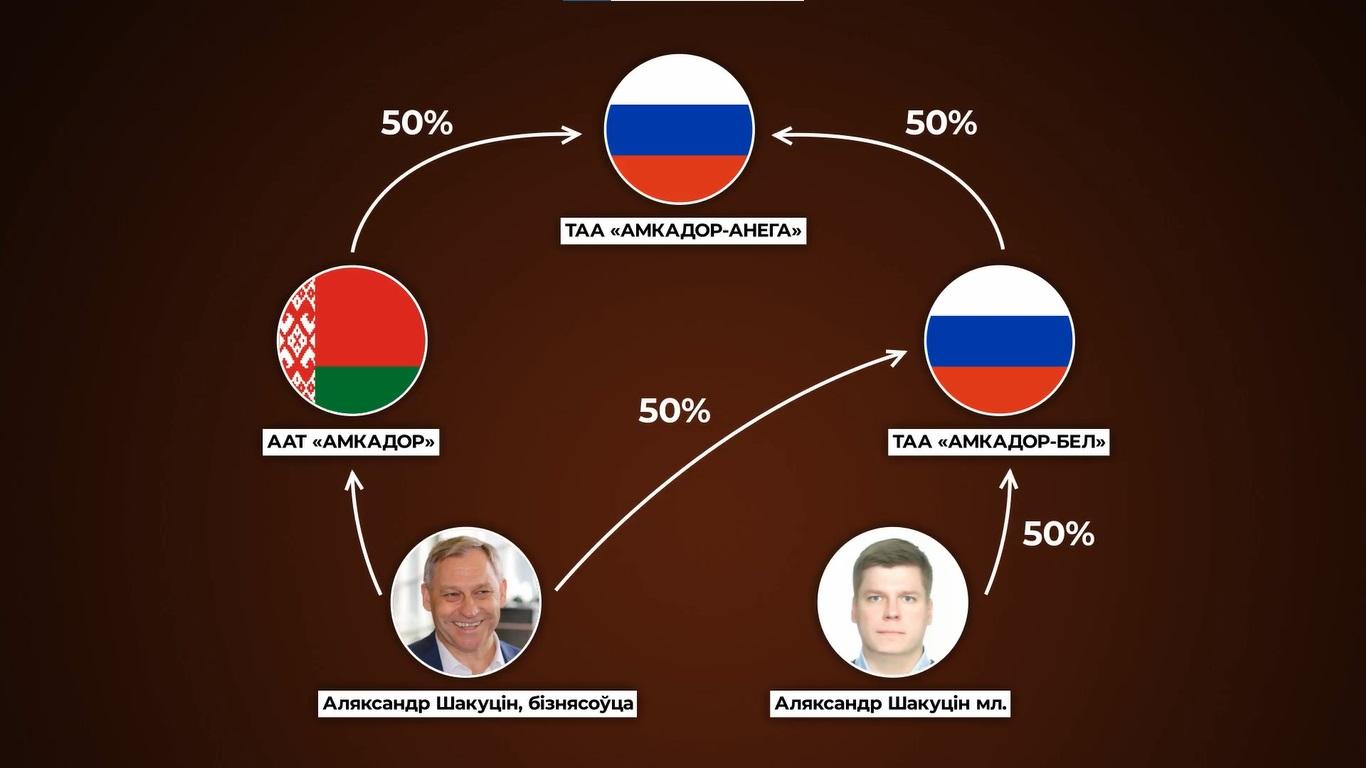The investigation was carried out in collaboration with Verstka publication (Russia) and supported by the CyberPartisans hacker group.
The EU ban on exporting machinery into Russia and imperfect sanctions legislation benefits a businessman known as the “moneybag” of Lukashenkо. Shakutin exploits the reluctance of Western manufacturers to lose revenue and takes advantage of the Russian import phase-out scheme. The opportunities have significantly risen due to Russia’s seclusion.
Adding on the Russian market under the guise of import phase-out, the Belarusian company Amkodor relies heavily on parts imported from other countries. Their quantity can be partially assessed through an announcement on the website of the Homel Chamber of Commerce and Industry for the year 2021. This list specifies the European machinery parts the enterprise aims to substitute because of sanctions or potentially unstable supply circumstances. A total of 32 components are listed, ranging from key elements such as harvesters and chopping units to small parts such as wheel rims, displays and joysticks. On Amkodor’s website, we discovered details about using parts for assembly produced in Europe, America, and Japan, despite some being on sanctions lists.
Shakutin, who has a close relationship with Lukashenko, is also subject to sanctions. They picked potatoes together, went on business trips and Shakutin’s wedding trip, and visited Lukashenko’s mother-in-law. He supported Lukashenko in the 2020 elections and took part in his secret inauguration. The EU has placed Shakutin on a blacklist. He is chairman of the board of directors of Amkodor holding, shareholder of SV Maschinen GmbH, UAB EM System, Anulatrans SIA, Amkodor-Tsentr, OOO Iskamed, OOO PMI Inzhiniring. The first part of the investigation will focus on Amkodor’s activities. In the second part, we will discuss SV Maschinen GmbH.
Special trading operation
July 2023, Ekaterinburg, Russia. 13th International Industrial Exhibition Innoprom. Shakutin, Head of the Board of Directors of Amkodor – Holding Managing Company, signed an agreement to create a wholesale and distribution service center for spare parts used for road and construction machinery and municipal vehicles outside Moscow. He also agreed to collaborate with Bashkortostan, one of the republics of Russia where Amkodor is constructing a factory, and discussed the progress achieved in 2022 as well as ambitious goals for 2023.
“At the close of last year, we held a 10% share in the Russian and Belarusian markets. Presently, we strive to raise our share to 50% this year.”
At the time of publication, five Amkodor plants were operating or under construction in Russian regions. Amkodor-Bryansk produces road building, municipal and agricultural machinery. At Amkodor-Onego in Petrozavodsk (Karelia), they make harvesters and machines for the loading and transportation of timber. The construction of the Amkodor-Agidel grain treatment farming machinery plant is nearing completion in Ufa, Bashkortostan. The Eksam municipal and farming machinery plant is under construction 40 km from St. Petersburg. The Amkodor-LTZ machine-building cluster is being established in Lipetsk, specializing in the production of tractors.
Except for the Bryansk factory, are all headed by Belarusians. Amkodor-Agidel is led by Fiodar Damatsenka, Lukashenko’s former aide for Minsk who headed Minsk Tractor Plant until 2019. [*][*] Eksam is run by Ihar Zalamai, who previously worked at the Belarusian Embassy in St. Petersburg. [*][*]
All these businesses receive government backing in Russia. They operate under favourable loan and land terms and are part of opportunity zones.
The holding is also financially supported in Belarus. In November 2022, Minsk and Moscow agreed that Belarus would receive 105 billion Russian rubles (about €1.5 billion) to finance import phase-out-related projects in Belarus, including those of Amkodor.
Imported substitute goods
In 2018, Amkodor purchased the assets of the bankrupt Onega Tractor Plant in Petrozavodsk and established Amkodor-Onego. The factory might become a part of the first Opportunity Zone in Karelia, the establishment of which was announced by regional authorities. It guarantees the company “a ready infrastructure created at the expense of the regional and federal budgets, tax benefits and the possibility of applying the customs procedure of a free customs zone”.
Amkodor-Onego assembles machines using some parts from Western companies. BIC investigators found that of 13 logging machines that were ready and available for sale, 12 used imported components. The manufacturer of most of the key elements is Finland-based Kesla.
Loading mechanisms produced by the Finnish manufacturer are found on forwarders (pulling tractors) Amkodor 2262 E, 2682 (Kesla 700/700T), Amkodor 2631 (Kesla 304), on skidding tractors Amkodor 2243 (Kesla 700RT).
The harvesters are equipped with loading mechanisms Kesla 671H (Amkodor 2531), Kesla 1395H (Amkodor 2541 and 2551), and Kesla 600 (Amkodor 2561). The same model is installed on some types of forwarders (Amkodor 2641, 2661-01, 2662), as well as on Amkodor 2904 chipper (chipping unit Kesla C645 is used in this machine).
In January 2021, Kesla announced it would halt shipments to Amkodor due to EU sanctions against Shakutin as an individual benefitting from the Lukashenko administration (although the company Amkodor is not sanctioned). But in May of 2021, Kesla declared it would supply Amkodor-Onego in Petrozavodsk after consulting with “experts knowledgeable about sanctions legislation as well as the Ministry of Foreign Affairs”. At that time, half of thatbusiness was owned by Amkodor – Holding Managing Company, and the remaining half belonged to Amkodor-Bel, which was owned by Shakutin’s son Aleksandr Shakutin Jr. [*][*][*][*][*]
Until March 2021, Amkodor-Bel was jointly owned by Shakutin Jr. and Shakutin Sr. The change in ownership structure enabled the firm to avoid European sanctions and keep Kesla as a supplier. [*]
Fewer orders, more sales
On 25 February 2022, one day after Ukraine was invaded, Kesla CEO Simo Saastamoinen declared the company would not deliver €10 million worth of goods to Amkodor-Onego. It then became impossible to sell parts to Russia because of EU limitations. The last pre-sanction contract expired in March 2023, a year after the war began. But Amkodor-Onego is still selling new equipment with components made in Finland, even though certain parts are prohibited from being exported to Russia.
Amkodor 2541, Amkodor 2551, Amkodor 2561, and Amkodor 2531 harvesters use Kesla loading mechanisms and harvester heads.
Amkodor-Onego also produces six types of forwarders, a 2243 skidding tractor and a chipper equipped with this manufacturer’s loading mechanisms.
In April 2023 Amkodor-Onego created its first loading mechanism prototype for harvesters, which is a complete replica of Kesla’s.
By examining Kesla financial reports , BIC discovered that when supplies were cancelled, the yearly total of orders dropped by almost one-third. But sales actually increased.
According to 2023 customs documents provided to BIC by journalists from the Russian media Verstka, Kesla's supply deals to Russia were made through companies registered in Turkey, Poland, Estonia and the United Arab Emirates. The main suppliers were the Polish company Bilax Sp. z o.o., which has a Belarusian beneficiary, and the UAE company Dakira General Trading Fzc. Some of the goods supplied are subject to sanctions restricting their export to Russia. BIC has no evidence that Kesla was aware of the purchase of components by these companies for further resale in Russia.
To find out whether it is now possible to order machines with sanctioned parts, we contacted Amkodor-Onego directly, as well as the company's distributor in the Urals. The manager of the Karelian office told us that since December of 2022, all machines have been fitted with loading mechanisms of their own manufacture. However, the distributor's representative not only agreed to accept an order for several harvesters with Finnish manipulators, but also guaranteed service for two years after the purchase, including the replacement of imported components. The dealer's commercial offer also states that they can produce machines with sanctioned Kesla loading mechanisms. [*][*][*][*][*]
Answering our inquiry as to the availability of banned Kesla parts in Amkodor machinery in Belarus and Russia, Kesla’s official representative said that the company was aware of the sanctions imposed on Shakutin in 2020 and had stopped working with companies linked to him in accordance with EU sanctions policy. The response also stated that Kesla had ceased operations in Belarus as of January 2021 and in Russia as of February 2022, and since then had not accepted any orders or delivered any goods, including spare parts, or provided any after-sales support to these countries. [*][*]
BIC has no evidence that Kesla was aware that Amkodor was the ultimate buyer of its products after the imposition of sanctions.
Shakutin Sr. stated in a phone conversation with BIC that Amkodor “produces all the components independently”:
“Amkodor is now the third (largest) producer of tandem axles worldwide, following Dana (US) and NAF. We manufacture our own tandem axles. The Kesla products you mentioned... all the manipulators, including 12 different types, are produced in our own factories. We manufacture them as a whole unit, we do not require Kesla. We started the production of harvester heads and they are being tested. Therefore, we no longer need products from Kesla, NAF (Germany) or the United States of America. We are self-sufficient today, independent of anyone, any company in the world. That’s it.”
Following that conversation, the offer on the Belarusian company's website changed: the loading mechanism and the harvester head on one of the machines were marked as produced by both Kesla and Amkodor, and the forklift with an Italian engine is no longer available.
Family contracting to circumvent sanctions
Engines are also a sanctioned product used in making Amkodor machinery. The EU banned their export to Belarus in June 2022 and to Russia in March 2023. The UK has joined the EU embargo on Russia. However, BIC researchers discovered German Deutz, British Perkins and Italian Iveco engines on the company’s goods. In the last week of August, a product with an Italian engine in the catalogue was replaced by a lift truck with a Chinese motor. The company also used manipulators created by Slovenian manufacturer Tajfun Liv, even though their distribution is prohibited.
Amkodor 20232 earthmovers use German Deutz TCD2013L064V engines, while Amkodor DC 200 crawler bulldozers use the same company’s TCD2012L062V engines.
Italian engines are installed on Amkodor D35 forklifts. British engines are found in the Amkodor 5350AG/5450AG wheeled tractors and the Amkodor 2662 E forwarders. Manipulators produced by Slovenian company Tajfun Liv are used in Amkodor 2243 skidding tractors.
By expanding into the Russian market, Amkodor not only takes over for foreign companies departing due to the Ukraine war, but also effectively avoids limitations imposed by the West. Shakutin, a blacklisted businessperson, is earning more money because of the limitations placed on Russia.
His family is also involved in this process. His wife Maryia possesses a 10% share in Amkodor-Tsentr. [*][*][*] In 2022, it earned €485,000. Half of this amount came from government contracts. [*][*] Shakutin Jr.’s Amkodor-Bel, which is registered in Tatarstan, made a net profit of over €200,000 last year. [*]
BIC has sent queries to Tajfun Liv, Perkins, Iveco and Deutz seeking comments. At the time of publication, we had heard back from two companies. Iveco Group stated that it was verifying our request. Tajfun Liv stated that it follows both national and EU rules. They state the company does not engage with individuals on the EU sanctions list and has not imported or exported any restricted products or components. [*][*]
We have no evidence that these companies were selling their components directly to Amkodor after the imposition of sanctions.
The sole responsibility for any content supported by the European Media and Information Fund lies with the author(s) and it may not necessarily reflect the positions of the EMIF and the Fund Partners, the Calouste Gulbenkian Foundation and the European University Institute.





